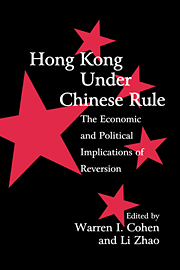Book contents
- Frontmatter
- Contents
- List of Contributors
- Introduction
- 1 Hong Kong as an International Commercial Center
- 2 Cooking the Rice without Cooking the Goose: The Rule of Law, the Battle over Business, and the Quest for Prosperity in Hong Kong after 1997
- 3 Hong Kong Faces 1997: Legal and Constitutional Issues
- 4 The Economic and Political Integration of Hong Kong: Implications for Government–Business Relations
- 5 Hong Kong and Greater China: An Economic Perspective
- 6 One Country, Two Currencies: Monetary Relations between Hong Kong and China
- 7 Political Participation in Hong Kong: Trends in the Mid-1990s
- 8 Strategic and Military Implications of Hong Kong Reversion
- 9 Hong Kong and China's Integration into the International Community
- 10 Hong Kong as a Problem in Chinese–American Relations
- 11 Post–July 1997 Challenges
- Index
8 - Strategic and Military Implications of Hong Kong Reversion
Published online by Cambridge University Press: 22 March 2010
- Frontmatter
- Contents
- List of Contributors
- Introduction
- 1 Hong Kong as an International Commercial Center
- 2 Cooking the Rice without Cooking the Goose: The Rule of Law, the Battle over Business, and the Quest for Prosperity in Hong Kong after 1997
- 3 Hong Kong Faces 1997: Legal and Constitutional Issues
- 4 The Economic and Political Integration of Hong Kong: Implications for Government–Business Relations
- 5 Hong Kong and Greater China: An Economic Perspective
- 6 One Country, Two Currencies: Monetary Relations between Hong Kong and China
- 7 Political Participation in Hong Kong: Trends in the Mid-1990s
- 8 Strategic and Military Implications of Hong Kong Reversion
- 9 Hong Kong and China's Integration into the International Community
- 10 Hong Kong as a Problem in Chinese–American Relations
- 11 Post–July 1997 Challenges
- Index
Summary
INTRODUCTION
ON July 1, 1997, the British Crown Colony of Hong Kong will revert from British to Chinese rule. For the leaders of the People's Republic of China (PRC), Hong Kong reversion and the creation of the Hong Kong Special Administrative Region (SAR) are a potent symbol of the end of nearly two centuries of maltreatment by exploitative foreign powers. For Beijing, regaining sovereignty over Hong Kong is a major step toward completing the reunification of China, a process that began with the proclamation of the PRC in 1949 and will be completed only after Macao and Taiwan are returned to the embrace of the motherland.
The reversion of Hong Kong is also a moral issue for Beijing: The British used coercive military force to establish their ownership of the territory. Although all Chinese governments since the 1840s have grudgingly accepted the reality of British control, and even profited by it, none has accepted the legal or moral basis for the British presence. (Leaders in Beijing and Taipei find common ground in their respective evaluations of the status of Hong Kong.) For Chinese Communists and Chinese Nationalists alike, reversion amounts to a correction of the historical record, or the resolution of an historical anomaly. The restoration of Chinese sovereignty is to be viewed as a moral act.
It is precisely for this reason that the stationing of members of the Chinese People's Liberation Army (PLA) in Hong Kong is an issue of transcendent importance for China's leaders.
- Type
- Chapter
- Information
- Hong Kong under Chinese RuleThe Economic and Political Implications of Reversion, pp. 184 - 197Publisher: Cambridge University PressPrint publication year: 1997

